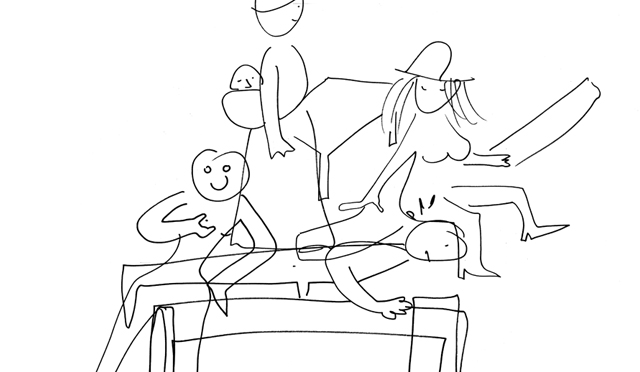Search
To search for an exact match, type the word or phrase you want in quotation marks.
A*DESK has been offering since 2002 contents about criticism and contemporary art. A*DESK has become consolidated thanks to all those who have believed in the project, all those who have followed us, debating, participating and collaborating. Many people have collaborated with A*DESK, and continue to do so. Their efforts, knowledge and belief in the project are what make it grow internationally. At A*DESK we have also generated work for over one hundred professionals in culture, from small collaborations with reviews and classes, to more prolonged and intense collaborations.
At A*DESK we believe in the need for free and universal access to culture and knowledge. We want to carry on being independent, remaining open to more ideas and opinions. If you believe in A*DESK, we need your backing to be able to continue. You can now participate in the project by supporting it. You can choose how much you want to contribute to the project.
You can decide how much you want to bring to the project.

At A*DESK we’ve always defended a critical stance, not just about art, but also concerning the world. This week we’re writing our (monthly) editorial dedicated to the global subject, from the pathetic position of anger. Anger that rids us of any sleep on a Sunday, and Monday night (…) still stunned by the English Brexit (the first triumph of the absurd at the end of a historic June) and totally floored by the results of the Spanish general elections.
We’d like to dedicate this month to a discussion about the global subject. To do so we count with an excellent critical revision of what the mobility of subjects implies today, the inequality of liberties according to the place of birth, personal limitations and what these mean. Anna Dot based on the projec “The Artist and The Stone”, by Matteo Guidi and Giulianna Racco, penned the brilliant “the possibility of appearing where you are not expected”.
Paloma Checa-Gismero, on her part, wrote a review of the book “Cultural Anthropophagy…” by Lisette Lagnado (ed.) and other authors. (London: Afterall, Exhibition Histories, 2016), that analyses the Bienal de Sao Paulo 1998, curated by Paulo Herkenhoff, who rescued the concept of anthropophagy from the poet Osvaldo de Andrade and turned it into the “axis of his rewriting of the relations between colony and metropolis”; a biennale considered by many to be a milestone in post-colonial discourse.
Rosa Naharro placed the accent of analysis on the institutional (artistic-cultural) response to a (supposedly thinking) subject of a global character. Revising practices, projects and programmes, but also indicating a clear, critical opinion regarding the dose of hypocrisy such programmes can house.
We bring the month to an end with Paulina Zamora de Otero and a very personal text that goes precisely (bingo!) to the mediocre subjects that believe (themselves or their opinion) to be relevant, transcending any value judgment. Paulina locates her reflection focussing specifically on her close to hand Guatemalan context, but this is a global problem with knobs on; subjects with barely any notion of community, lacking in solidarity and way too short-sighted.
We’ve dedicated this month to delving into what it means, or ought to mean, to be or to think of oneself as a global subject. And it seems particularly relevant in the European Union with the United Kingdom, in a Spain where mediocrity won and wins, thrown into four more years of scurvy, ridiculous representatives, while in the United States a maniac could win the presidential elections.
Given the generalised foolishness and the short term, ignorant political responsibility we seem to be immersed in, and because we still believe in the margins and manoeuvrability of every subject, today A for A*DESK is A for anarchy. And for asperity, because we won’t lower not even one jot the critical tone with which we can publish, from culture and beyond.

A*DESK is a critical platform focused on publishing, training, experimentation, communication and dissemination in relation to contemporary culture and art, which is defined by transversality. The starting point is contemporary art, because that is where we come from and this awareness allows us to go much further, to incorporate other disciplines and forms of thought in order debate issues that are relevant and urgent for understanding our present.
"A desk is a dangerous place from which to watch the world" (John Le Carré)